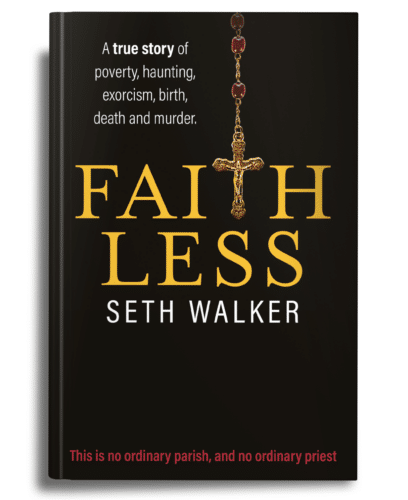How did a gifted Christian Minister become an atheist?
In my ignorant naivety I thought I could bring hope to this village, hope in Jesus
This is the true story of a gifted young evangelist called Seth. Seth moves into one of the most deprived housing estates in England to work for the local church and finds himself thrown into a chaotic and troubled world. There are flare-ups with multiple families living in the same house, bizarre cases of spirit possession, and Seth even finds he has to fight to physically defend himself. Cases of mental illness and domestic abuse all end up on his doorstep. From a young man with a knife, popping epilepsy pills and swallowing screws, to harrowing cases of partners being beaten and children who may have been abused.
As the subtitle of his new book, Faithless, states, “this is no ordinary parish and no ordinary priest”.
Despite this chain of trauma, Seth’s pastoral heart shines bright, and he eventually becomes an integral part of this dysfunctional but very human community and even earns their respect. A fascinating scene unfolds one day when Seth is called to a house where there is a suspected child abuser. Even though the man is most likely innocent, an armed crowd has gathered to administer a beating. In a moment strikingly reminiscent of “the woman caught in adultery” (better titled, “men caught in hypocrisy”), Seth aligns himself with the accused. He quietly dispels the crowd, but at no small risk to himself. Over time, Seth pays a heavy price in stress, lost sleep, and constant worry.
Ultimately, it looks like “well done good and faithful servant”, and a prelude to a lifelong ministry to inspire us all.
But that’s not what happens.
Through these life experiences, the young evangelist finds his faith challenged and, eventually, unpicked. This book charts Seth’s “conversion” from the heights of evangelical fervour to atheism. It is Seth’s account, based on his journals, writing today 30 years after the events, and writing as an atheist.
Why did Seth lose his faith?
A few weeks ago I met Seth.
I had to because his story seemed so extreme. I was expecting a rough, hardened character, but what I found was a thoughtful, gentle and unassuming man in his fifties. We went through the reasons for his loss of faith. There are no easy answers, but there are lessons:
1. Violence and incoherence in the Old Testament
“Take a passage like …. kill all the Midianites but save every girl who has not slept with a man for yourselves (Numbers 31)”, says Seth. “If that’s inspired, God did a pretty rubbish job”.
To Seth, as to many evangelicals, the Bible was supremely important. “But it’s either the inspired word of God or it isn’t”, he says, “you can’t just say some bits are inspired but others must be viewed through culture”. He continues: “why didn’t God just say, ‘let’s not do slavery’? If he’s a God who never changes, then speaking a little love could have been a powerful message”.
Most Christians don’t study the Old Testament, and most churches painstakingly avoid troubling passages on a Sunday morning. There are responses to these difficult questions – the links at the end may help — but when people come up with these and other disturbing topics, how do we handle them? Do we have an open culture that invites hard questions, or do we pretend they’re not there?
2. Christian theology gone wrong
Seth says his evangelical upbringing shaped him to take the blame for everything that went wrong in his life, while giving all the credit for his successes to God. He says, “this was a double blow to my self-esteem … a liberal application of the stick combined with a denial of the carrot”.
This view sounds holy, but we need to question it. We are not always responsible for things that go wrong in life. Similarly, it’s good to give glory to God but, if we have done something well it’s fine to acknowledge we did it. We’re not puppets that God controls to achieve good deeds. Of course, our acts of kindness and goodness are inspired by our desire to follow Jesus, but it’s OK to acknowledge, without boasting, that we did them. Bad theology hurts people.
He took the blame for everything that went wrong in his life, while giving all the credit for his successes to God
3. Narrow dogmatic beliefs
There’s nothing wrong with simple faith. Jesus asks us to come like a child after all. But simple is different to simplistic. Simplistic, narrow faith in my experience is more tribal than Biblical, more concerned with identity, less bothered with insight.
By his own description, Seth’s evangelical faith was narrow and dogmatic. For example, his aim in the community was always to get people over the line … get them to say the sinner’s prayer. Then, whatever else happens, in Seth’s words, “…it’s notches on my Bible cover right!”.
Certainly, people need to come to Christ – and that may involve such a prayer — but getting people to become Christians can be easy; helping them struggle through life is hard. This is especially true in marginalised communities which many middle-class churches have no concept of. We end up encouraging people to say the 4‑line prayer to a Father Christmas figure who can leaves us crushingly disappointed when he fails to deliver.
There are materials out there on “deconstructing” beliefs we were fed in good faith but are ultimately mistaken. These can be helpful as long as we are reconstructing something at the end. Working through legitimate doubts to a place of confidence is possible, but it usually requires us to give up some long-held, tribal belief.
4. Lack of support and care
Seth is clear that he does not blame the church for any lack of support. He feels he should have asked for help, but he did not.
Nevertheless, we must acknowledge the stresses faced, particularly by young ministers and church workers, and the impact this can have on faith. It looks like they’re doing great … they always have the right words from the front, they’re “getting people over the line”, and they pray and read their Bible (we think) … but their personal faith may be another matter. In the end, they too are human, they too have doubts. They too need people to offload to.
I recall when I completed theological training, my college presented me with a simple framed picture I keep above my desk. It’s in the shape of a heart and quotes three words from Proverbs4:23:
Why do some Christians lose their faith?
Seth, today, feels he has meaning and purpose without God. “If I want to be connected to something bigger than myself”, he says, “I run on the moors, I listen to the brook that’s been running for thousands of years and will run for thousands more. If I want to feel part of something eternal, there are atoms within me that were formed within a star millions of years ago. I look at my children, for all their good and bad, and know that I will live on through them”.
3 years ago, I posted a blog titled: Why do Christians Lose Their Faith. It was very widely read and still attracts comments and emails. Reading through these, I see overlaps with Seth’s own loss of faith: disappointment with God, lack of truly open discussion, lack of support within churches. But in many cases, it’s not God they have stopped believing in, it’s the caricature of God they were sold and, sometimes, it’s the church they have stopped believing in.
It’s not God they have stopped believing in, it’s the caricature of God they were sold
Seth’s book contains huge experience, searching and heartache. It is the work of many difficult months, and we owe Seth a debt to take seriously how those around us may struggle with believing everything our churches teach. Finding places where people can be totally honest is good. Assuring people they can still belong to a loving community even if they don’t believe, is vital.
If you have questions for Seth or myself, please use the Comments facility below, or email me, chris@7minutes.net




I’m an atheist after 45 years as a Christian. The thing that started the change was getting tired of making excuses for God’s passivity in the face of the horrors that happen to people. Good parents with no religious beliefs would never find a reason to do nothing if their beloved children were being tortured. Yet a loving, all powerful God does this with his human creations thousands of times over every day. Stands by and does nothing. The idea that he can’t do too much or it will limit free will is so full of logical holes! Since then… Read more »
Hi Lisa Thanks for commenting. I dont think the free will argument has logical holes: So, how much then should “a good God” intervene? Should he stop all wars and destruction caused by people? How? Should he stop the driver on his phone who is about to drive into a child? How? Aside from the free will thing of course there are other awful things in the world inc natural disasters and disease. And I don’t want to understate these. They are there and they are awful as you say. There is of course the important point that even here we… Read more »
I came across your site. Very interesting. I also read your post about Seth, the minister who became an atheist. His story is understandable, yet is still sad to me as well. What happens to a person like Seth when he dies? Do they go to hell because they have turned their back on their faith in God or does God, who knows all that can be known, show him mercy in the end? I have bookmarked your site and will return to read some more of your writings. Good site my brother. Thank you for it. Have a tremendously blessed… Read more »
Thanks for reaching out Richard and for your kind thoughts and words.
I think ultimately, yes it has to be down to God’s grace and mercy. I think the passage on apostasy is in Hebrews (Hebrews 10?)
However, I increasingly feel there is much more to how Christ can reach people than our limited understanding allows. I think there are scripture texts to support this idea.
So yes, we pray for those we know who have not responded to the gospel, or even responded and for some reason let go of their faith.
Living in a spiritual war zone is tough, and many many christians become ill spiritually and physically as a result as sometimes we think it will be easy street, but its not. its tough. Most times when I have stepped out at Gods bidding to do something in faith.. there comes a spiritual backlash via a source not foreseen, as the Devil hates us doing Gods work and knows how to attack us.. so we need one another to step out onto the parapet and trust God that he has out backs.. look at what Jesus did.. he met people… Read more »
Thaks for your thoughts here Duncan
Hi Chris Just read your latest blog/review & found it most helpful. During the 1960s my ministerial training was almost all about Biblical knowledge, Church History, Philosophy of Religion, Christian Ethics, Comparative Religious Studies, preaching, & with a bit of NT Greek thrown in for good measure. All from an academic & historical perspective. There was little about practical ministry & the realities of the big wild world. Some psychology would have been extremely helpful in terms of communications, making assumptions (Cognitive Economy) & counseling in particular & above all issues like Cognitive Dissonance which is a key issue relating to… Read more »
Thans — Re the estate work I have done- yes indeed but I don’t feel I saw the same extent of poverty as Seth. I think that’s because he lived in his community (I didn’t) and he lived on possibly the toughest street in that community. Tremendously brave and definitely incarnational, but … it broke his faith. And yes I am sure your experience is shared by others also.
Another Belta Chris
In fact I re read the others as well which were also wonderful and uplifting
V grateful for your work
Thanks for this — his book is £1.99 for Kindle on Amazon atm so I’ve bought it
That’s sad but it happens often. We know of a young minister who went to a Church full of excitement and he didn’t get the support. His wife and him are separated I pray they will reunite. He only does funerals now.
Seth sounds like an amazing guy. I can only imagine the stress he faced under those excruciating circumstances.
“Bad theology hurts people”, is so true and is applicable in every religion.
Another fascinating post Chris!
Great to see you here Chevaan and thx for the comment. I hope all is well back at the ranch” 🙂
I have no problem with the Old Testament God. It is the god Seth subconsciously created in his own image that led to internal conflict. Life is under a curse due to sin, only the grace found in Christ can lessen its blow. The Father Christmas god mentioned above has never existed.
The Old Testament God is an utter disgrace who perpetuated slavery in the Caribbean and deep south of the US. He is a horrible, nasty, reactionary character.
Hi — you are talking about the extreme — and utterly unbiblical — doctrines of the deep south and that was in fact the start of the American civil war. I don’t think you can blame God for man’s inhumanity against man